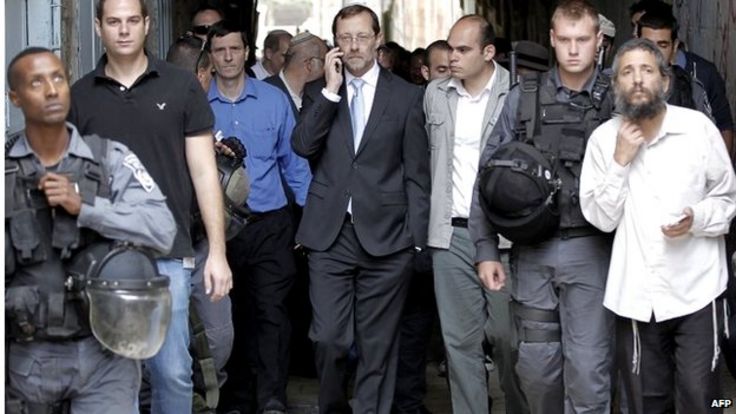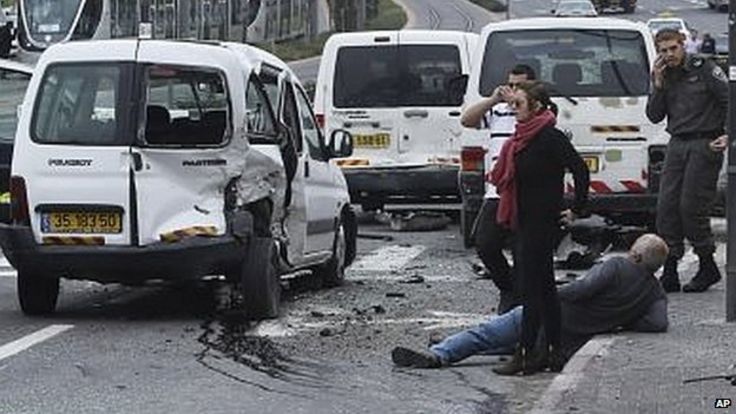- 7 November 2014
- From the section Middle East
Jerusalem a city on edge as tensions spiral
Confrontations between young Palestinians throwing stones and armed Israeli police are now an almost daily occurrence in Shuafat in East Jerusalem.
The residential streets around the house of Hussein Abu Khdeir, through which the city's tramline passes, are regularly transformed into a battleground.
It has been this way since his son, 16-year-old Mohammed, was abducted and burnt alive by Jewish extremists in July. The murder was a revenge attack for the killing of three young Israelis by Palestinian militants in the West Bank.
"He was the spark that lit this uprising. Now we're facing a lot of problems with the [Israeli] Occupation and having the Israeli border police next to our home only makes matters worse," says Mr Abu Khdeir. "Anger is rising."
Israel has occupied East Jerusalem since capturing it from Jordan in the 1967 Middle East war. It annexed the sector in 1980 in a move not recognised internationally.
Palestinian residents have long complained of discrimination, and blame increasing tension on the growing number of Jewish settlers moving to the area.
The settlements on occupied land are considered illegal under international law, though Israel disputes this.
Flashpoint compound
Since Mohammed Abu Khdeir's death, hundreds of Palestinians have been arrested for involvement in protests in Arab neighbourhoods including Silwan, Abu Tor and Issawiya.
Recent clashes have been fuelled by Jewish demands to lift a ban on their religious practices at Jerusalem's most sensitive holy site in the heart of the Old City.

The al-Aqsa mosque compound contains the third most sacred place in Islam. It is also the holiest place for Jews because of the two temples that stood there in biblical times.
Under current rules, Jews are allowed to visit but cannot pray at the compound, which they know as the Temple Mount while Muslims call it al-Haram al-Sharif.
Fears that Israel is set to legislate to remove the ban have led to furious scenes as Palestinian Muslims try to block visits by parties of far-right, religious Jews escorted by Israeli police.
"We love it when it is calm to pray but the Israeli government is not helping the situation by sending right-wing extremists and ministers to visit," says Omar Kiswani, director of al-Aqsa mosque.
On Wednesday, Jordan - the official custodian of the compound - recalled its ambassador to Israel after clashes between Palestinians and Israeli police outside the mosque.
The Israeli Prime Minister, Benjamin Netanyahu, has since told Jordan's King Abdullah that there is no plan to change restrictions on Jewish prayer and so contravene the terms of their countries' 1994 peace treaty.
Government spokesman Mark Regev told the BBC that Mr Netanyahu had conveyed the same message to rightists in his coalition government.
"He has emphasised that there will be no change in the status quo on Temple Mount and that whoever expresses a different view is representing their own personal view and not government policy," Mr Regev said.
Barricades
On the Palestinian side, the Islamist group, Hamas - a sworn enemy of Israel - has capitalised on popular anger about the al-Aqsa mosque.
A Hamas militant killed two people this week after driving a van into a group of pedestrians in Jerusalem close to a tram stop. It was the second such attack in a fortnight. In both cases the drivers were shot and killed by Israeli security forces.
"I saw the blood all over the tram tracks. It was like being in a horror movie. Everyone is in such a shock," says Daniel Sinclair, a Jewish seminary student from London who lives near the scene of the latest incident.

"Since I got here my parents have just wanted me to go home because Jerusalem has become very dangerous."
Many areas of the city - particularly those in the east - remain on edge. Israeli security has been visibly increased.
Concrete barricades have been installed at platforms along the tramline. Police have set up roadblocks and deployed reinforcements at key road junctions.
At the al-Aqsa mosque compound, age restrictions continue to be imposed on Palestinian worshippers heading to Friday prayers, a move described by Israeli authorities as a security measure.
There are concerns that the dispute over the holy site could escalate further.
On Thursday, a week after the attempted murder of a prominent right-wing Jewish activist, Rabbi Yehuda Glick, there was a rally by his supporters.
"The minimum is that everyone of every religion has the right to pray at Temple Mount," said one of the activists Yehiel Yisrael.
"We also want to rebuild the temple but that will not happen without a national conversation. At the moment the wrong people are in charge."
The future of Jerusalem has always been at the heart of the Israel-Palestinian conflict.
Israel sees a united Jerusalem as its capital. The Palestinians want to establish an independent state in the West Bank and Gaza with East Jerusalem as its capital.
In the absence of peace talks to address the core issues, there are many reminders that the political vacuum can quickly be filled by violence.
'뉴스 섞인 사진과 글' 카테고리의 다른 글
| 「帝国の慰安婦」朴裕河教授の在宅起訴に学者ら54人抗議声明(全文) (0) | 2015.11.28 |
|---|---|
| LG Electronics changing OLED strategy to expand sales (0) | 2015.11.25 |
| 천경자 장녀 "유골, 강아지와 산책한 허드슨 강가에 뿌렸다" (0) | 2015.11.12 |
| Elder Bush criticizes Cheney, Rumsfeld in new biography (0) | 2015.11.05 |
| Seoul searching: Asian leaders meet - The Economist (0) | 2015.11.04 |